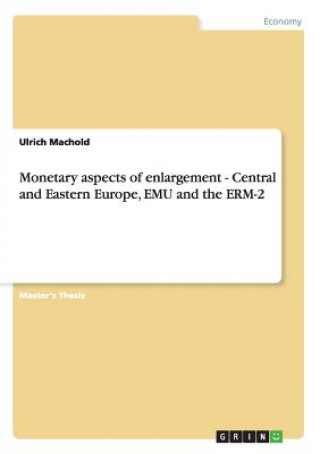
Kód: 05277787
Monetary aspects of enlargement - Central and Eastern Europe, EMU and the ERM-2
Autor Ulrich Machold
Master's Thesis from the year 2002 in the subject Economics - Monetary theory and policy, grade: 1.0 (A), Technical University of Berlin (-), 54 entries in the bibliography, language: English, comment: , abstract: A rough 50 years ... celý popis
- Jazyk:
 Angličtina
Angličtina - Väzba: Brožovaná
- Počet strán: 64
Nakladateľ: Grin Publishing, 2008
- Viac informácií o knihe

Mohlo by sa vám tiež páčiť
-

Multiple Criteria And Multiple Constraint Levels Linear Programming: Concepts, Techniques And Applications
163.78 € -

RFID and the Internet of Things
206.67 € -

Total Solar Eclipses and How to Observe Them
32.75 € -4 % -

Cannibals - the Discovery and Representation of the Cannibal from Columbus to Jules Verne
80.86 € -

Stammesgeschichte Der Saugetiere
51.99 € -

Die NEUE Kinder-Uni Wissens-Box, 7 Audio-CDs
26.91 € -4 % -

Vreni Shizzo, 1 DVD
28.75 €
Darčekový poukaz: Radosť zaručená
- Darujte poukaz v ľubovoľnej hodnote, a my sa postaráme o zvyšok.
- Poukaz sa vzťahuje na všetky produkty v našej ponuke.
- Elektronický poukaz si vytlačíte z e-mailu a môžete ho ihneď darovať.
- Platnosť poukazu je 12 mesiacov od dátumu vystavenia.
Viac informácií o knihe Monetary aspects of enlargement - Central and Eastern Europe, EMU and the ERM-2
Nákupom získate 148 bodov
 Anotácia knihy
Anotácia knihy
Master's Thesis from the year 2002 in the subject Economics - Monetary theory and policy, grade: 1.0 (A), Technical University of Berlin (-), 54 entries in the bibliography, language: English, comment: , abstract: A rough 50 years after its foundation, the European Union (EU) is preparing for the probably most ambitious challenge of its existence, the binding-back into the West of the once centrally-planned economies of Central and Eastern Europe (CEEC). Together with political and general economic efforts, European monetary integration also gains speed with as many as twelve CEEC queuing up for entry into the EU (not including Turkey, which has not yet officially begun entry negotiations), the first of them most likely joining the Union already two years after the physical introduction of the single currency, i.e. in 2004. Many of these countries are eager to also join Monetary Union (EMU) and show their ability to be good Europeans by adopting the Euro as soon as possible. Various statements by both CEEC-government officials and monetary authorities exemplify this very vividly.§This implies that the enlargement of EMU is already a relevant issue. By the time it becomes acute, positions and perspectives of both applicants and current members should be clear, if unnecessary delays and political irritations are to be avoided. The body of literature on the subject is thus as large as the questions of when, how and on what terms CEEC-accession will take place are pressing, and becoming more so as time progresses.§This study attempts to coherently examine the core issues related to EMU-enlargement, equally synthesising the various segmented approaches of the academic debate, and deduce normative conclusions as to what strategic outlook should seem appropriate to both CEEC and the current EMU-12: In what timeframe should accession most sensibly take place? How appropriate are the mechanics leading up to EMU, most prominently the Exchange Rate Mechanism (ERM-II) and the Maastricht criteria, and how should they be dealt with? What are the most likely problem areas and deficits that need to be confronted? Since there appears to exist a more or less stable consensus regarding the basic desirability of EMU for the CEEC, the paper will concentrate more on the run-up to full EMU, equally the road to the euro, and place special emphasis on the CEEC s attitude towards the ERM-II.
 Parametre knihy
Parametre knihy
Zaradenie knihy Knihy po anglicky Economics, finance, business & management Economics
59.77 €
- Celý názov: Monetary aspects of enlargement - Central and Eastern Europe, EMU and the ERM-2
- Autor: Ulrich Machold
- Jazyk:
 Angličtina
Angličtina - Väzba: Brožovaná
- Počet strán: 64
- EAN: 9783638886246
- ISBN: 3638886247
- ID: 05277787
- Nakladateľ: Grin Publishing
- Hmotnosť: 95 g
- Rozmery: 210 × 148 × 4 mm
- Dátum vydania: 11. January 2008
Obľúbené z iného súdka
-
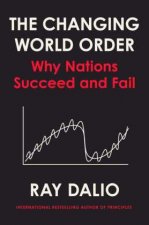
Principles for Dealing with the Changing World Order
24.35 € -12 % -

Why Nations Fail
14.42 € -23 % -

Misbehaving - The Making of Behavioral Economics
10.64 € -11 % -

Start-Up Nation
9.10 € -24 % -

Business Model Navigator, The
26.71 € -14 % -

Team Topologies
23.94 € -12 % -
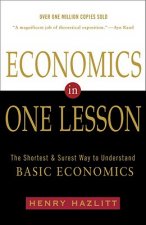
Economics In One Lesson
15.75 € -23 % -

Freakonomics
9.10 € -10 % -

Rational Optimist
13.71 € -

Art of Statistics
10.94 € -24 % -
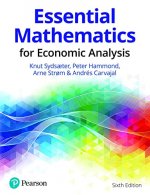
Essential Mathematics for Economic Analysis
73.18 € -1 % -

Liar's Poker
13.71 € -

Predictably Irrational
14.94 € -19 % -

Irrational Exuberance
20.46 € -8 % -

Price of Inequality
10.53 € -22 % -

The Invisible Hand
7.97 € -22 % -

How I Made One Million Dollars Last Year Trading Commodities
53.32 € -

(Mis)Behaviour of Markets
14.42 € -23 % -

Breakthrough Copywriter
17.80 € -

Economics 101
14.83 € -18 % -

Leading at a Higher Level
34.59 € -

Cartoon Introduction to Economics
19.75 € -8 % -

Human Action
38.07 € -

Fed Up
25.58 € -18 % -
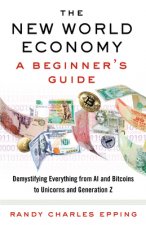
New World Economy: A Beginner's Guide
15.34 € -21 % -
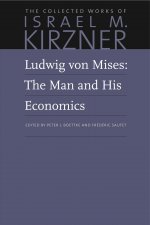
Ludwig von Mises
22.92 € -

J R
27.63 € -5 % -

Radical Uncertainty - Decision-Making Beyond the Numbers
19.03 € -2 % -

Speak Up
18.72 € -13 % -

Pyramid Principle, The
51.28 € -
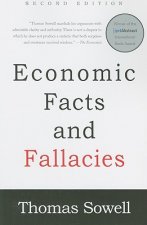
Economic Facts and Fallacies
16.98 € -20 % -

A-Level Economics: Year 1 & 2 Complete Revision & Practice (with Online Edition)
28.35 € -9 % -

Scrum - A Pocket Guide - 3rd edition
22.82 € -4 % -

Debt, 10th Anniversary Edition
28.04 € -22 % -

Freakonomics
6.44 € -25 % -
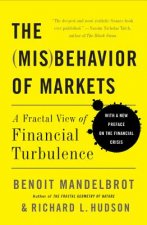
Misbehavior of Markets
24.66 € -
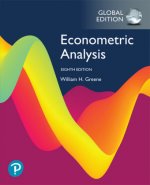
Econometric Analysis, Global Edition
86.59 € -

Hypomanic Edge
21.18 € -12 % -
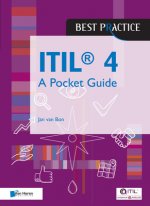
ITIL4 A POCKET GUIDE
25.17 € -

Decision Book
16.16 € -16 % -

Principles of Economics
15.96 € -13 % -

45 Second Presentation That Will Change Your Life
10.02 € -19 % -
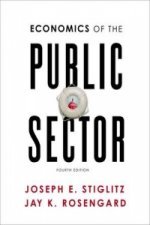
Economics of the Public Sector
83.32 € -

Discovery, Capitalism & Distributive Justice
22.92 € -

Economics: The User's Guide
14.42 € -23 % -

Think Like a Freak
9.71 € -25 % -

Phishing for Phools
16.37 € -14 % -
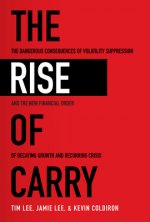
Rise of Carry: The Dangerous Consequences of Volatility Suppression and the New Financial Order of Decaying Growth and Recurring Crisis
27.73 € -16 % -

Cult of We
12.27 € -23 %
Osobný odber Bratislava a 2642 dalších
Copyright ©2008-24 najlacnejsie-knihy.sk Všetky práva vyhradenéSúkromieCookies



 21 miliónov titulov
21 miliónov titulov Vrátenie do mesiaca
Vrátenie do mesiaca 02/210 210 99 (8-15.30h)
02/210 210 99 (8-15.30h)